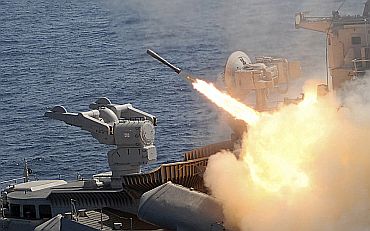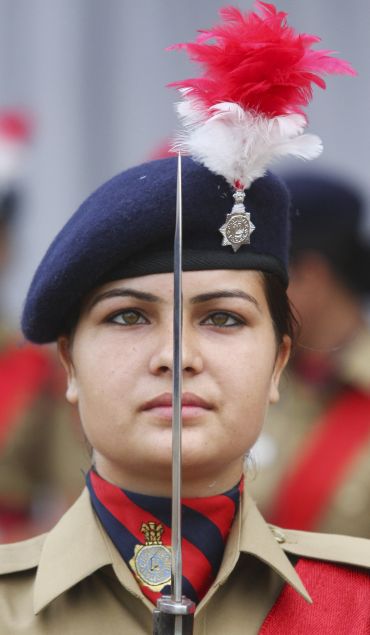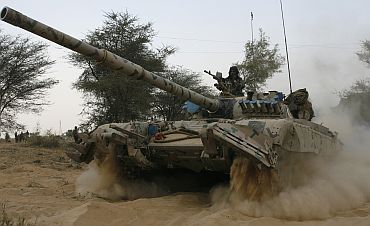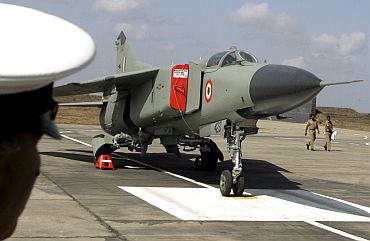 | « Back to article | Print this article |
India seeks 'open, balanced, inclusive' global security set-up
Warning of the possibility of a limited war under a nuclear backdrop in the future, India on Thursday sought a new 'open, balanced and inclusive' global security architecture that corresponds to modern threats such as hi-tech terrorism and cyber conflicts.
National Security Advisor Shivshankar Menon also called for a study of India's practices in use of force as a statecraft, considering that values and justice have always dictated its doctrines.
Menon was delivering the key-note address at the National Defence College Golden Jubilee celebrations in New Delhi. "What India seeks is a new security architecture -- an open, balanced and inclusive architecture to correspond to the new (security threat) situation that is emerging," Menon said.
Click NEXT to read further..
'Emergence of technology has helped terrorists'
"It also seems from the recent experiences that the utility of force as traditionally configured and conceived is of limited value in protecting society or achieving some policy goals. But one can hardly jump to conclusions about the futility of force when limited war under nuclear conditions remains possible and when adversaries need to be deterred," he said.
He said emergence of technology had led to terrorists too laying hand on sophisticated systems, alongside cyberspace emerging as a domain for conflict.
Moreover, these non-state actors were also drawing strength from state institutions. "Unfortunately, we have seen technology place increasingly lethal power at the hands of non-state actors. Terrorism is technologically enabled and knows no boundaries today, even drawing on support from state systems," he pointed out.
"States were no more the predominant factor in today's world. We have also seen new domains for confrontation such as the cyberspace," he said.
'Use of force necessary in certain circumstances'
Calling for an in depth study of Indian ways of using force, he said historically there had been a "strategic culture" in the country that hinged on "achieving justice" under circumstances when all alternative means had been exhausted without fighting a war.
Quoting from Indian epics Mahabharatha and Ramayana, Mahatma Gandhi's views, Chanakya's Arthasastra and King Ashoka's life, Menon said, "In the Indian tradition, use of force is legitimate not just if it is in a good cause and its results will be good. Instead it is about a doctrine that saw force as necessary in certain circumstances to obtain justice, when all other means are exhausted."
Indian traditions, he said, recognised that use of force was not always the most effective or efficient means, but was essentially a defensive use when other means were exhausted.
'India must avoid weakness at all costs'
Citing from history, Menon said though Mahatma Gandhi had led the Indian freedom struggle on the principles of "truth and non-violence", he had approved of use of force when the Indian Union had rushed troops to defend Kashmir in 1947 and had called for wiping out the Pakistani raiders.
"In saying so, Gandhi ji was keeping with the long regarded tradition of using force as legitimate in certain circumstances, if there is alternative way of securing justice," he said.
Another lesson that India drew from history, Menon said, was perils of weakness. "The colonial narrative of India's history, outside invasions and rulers had, as a corollary as a conviction, taught that India must avoid weakness at all costs, lest that history be repeated," he added.
'Defensive war is acceptable to India'
The NSA said Indian quest for strategic autonomy and for autonomy in decision to use or threaten force as a norm after 1947 had a tradition behind it.
"Indian strategic culture has an indigenous construct on the role of force in statecraft, modified by our experience in the last two centuries. War and peace are continuing themes in Indian strategic culture. By not celebrating war, the culture treats defensive war as acceptable. Indian strategic culture has been comfortable with this contradiction," he noted.
As a result of acceptance of the contradiction, Indian strategic culture supported "an ethical view" that dovetailed very easily with the international norms of conduct, whether legal, war or human rights.
'Nuclear weapons are essential for India's security'
"It is a culture that tends instinctively to pluralism, tolerance of different views and positions, and relies on argumentation, diplomacy and law, before taking recourse to use of force. It is, therefore, no surprise that it seeks a rule-based international order to limit the anarchy among states," he noted.
Indian strategic culture had three different schools and these differed on "means" but not on "strategic goals," Menon said, pointing out that all the streams, interestingly, believed that "nuclear weapons are essential for India's security in a world that has shown no signs of moving to their abolition and elimination."
He said, "There are substantial agreements on values, on goals and even on means in our policies, despite the marked and rapid changes in the external environment in which we have operated."





